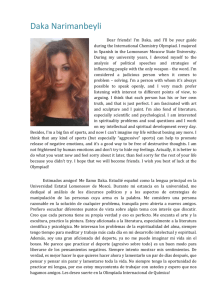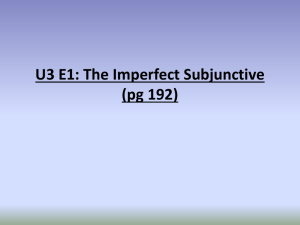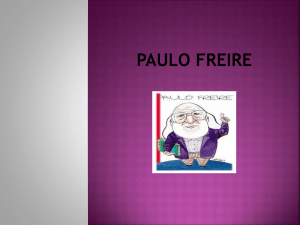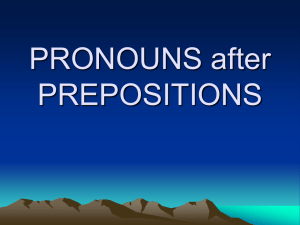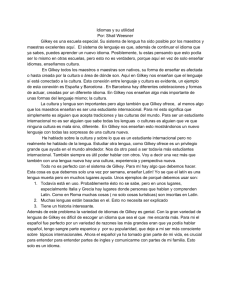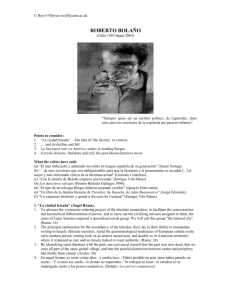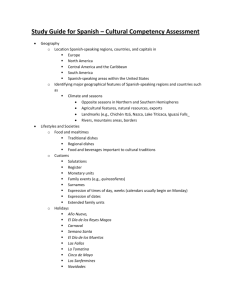CHANTAL MAILLARD
advertisement
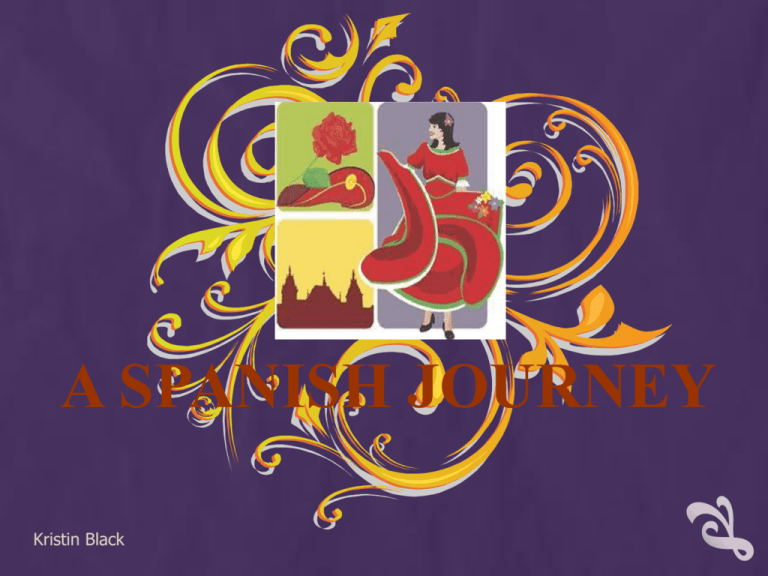
A SPANISH JOURNEY Kristin Black TABLE OF CONTENTS Introduction BLANCA ANDREU 8 … 9 Amor mío, amor mío, mira mi boca de vitriolo … My love, my love, my mouth look vitriol (translated) 5-7 10 … Dos 11 … Two (translated) 12 CHANTAL MAILLARD 13 … Anduve por el dorso de tu mano, confiada… 14 … I was in the back of your hand, trustful… (translated) 15 … Axis mundi 16 … Axis mundi (translated) 17 TABLE OF CONTENTS LEOPOLDO MARíA PANERO 18 … Haiku 19 … Haiku (translated) 20 … La oración 21 … Prayer (translated) 22 ANA ROSSETTI 23 … Yesterday 24 … Yesterday (translated) 25 … Sálvame 26 … Save me (translated) 27 TABLE OF CONTENTS LUISA CASTRO 28 … Inocencia 29 … Innocence (translated) 30 … Sobre ti, sobre todo. Sobre lo que es locura… 31 … About you, above all. On what is madness… 32 Works Cited * Translations done by Microsoft Translate 33-34 A SPANISH JOURNEY: THROUGH THE WORDS OF A POET “Surrounded on three and one-half sides by water and connected to France by a relatively narrow strip of mountainous land, Spain has historically been isolated and inaccessible.” (Chandler) That being said, it goes hand in hand with where Spanish Literature began. The isolation gave hope for a wild imagination in the world of Literature. “The Spanish genius is largely undisciplined, impetuous, uncalculating, and given to quick improvising and verbosity. It often scatters its energies over many pieces rather than concentrating heavily on one. This inclination to improvise rather than refine and polish may have reduced the number of the Spanish masterpieces , but it has freed the Spanish writer for astonishing flights and great outburst of passion and exuberance. Improvisation doe not necessarily mean carelessness, and one is often amazed that so much good work can come from the pen of a single author.” (9 Chandler) . Spain, an isolated country with a passion for life, began it’s quest to introduce extraordinary Spanish literature long ago, that dates back to the Medieval ages. “Historically and culturally” (1 Chandler) the center of what is considered Spanish lays Castile, the first official language of Spain. However, today, Spanish is considered the official language of Spain. The different eras include Early Middle Ages, Later Middle Ages, After 1492, The Golden Century, Romanticism, 1889-1926, 1927-1936, 1939-1975, 1975-present. Several award winning poets from the “1975-present” era include those of: Blanca Andreu, Chantal Maillard, Leopoldo Maria Panero, Ana Rossetti and Luisa Castro. These select few, share similar characteristics and a great passion for literature. For example: Blanca Andreu has been shown to use “dreamlike imagery”, “fragmented syntax”, and a “highly challenging use of language.” (Sherno) Sylvia Sherno mentions “Whether Andreu is defending language as inherently possessed f meaning, of lamenting language’s incapacity to convey meaning, all of her work is unified by a desire for truth and spiritual illumination.” (Sherno) Maillard, Panero, Rossetti and Castro genuinely share the visual imagery demonstrated above. Characteristics of Spanish Literature include Democracy, Stoicism, humor, dignity and honor. Spanish literature could be portrayed in a democratic nature, since it relates the folk legends and drama. Stoicism has been around for quite some time. “The Spaniard maintains a stoic attitude towards life’s joys and adversities and faces death serenely.” (10 Chandler) Humor is a large part of the Spanish lifestyle. Lastly, dignity and honor weigh heavy to a Spaniard and at times can be exaggerated to help one feel appreciated. In modern times, Spanish literature seems to carry most of the same characteristics as traditionally mentioned. “The virility, sobriety, generosity, dignity, honor, adventure, romance, nobility, hospitality, independence, faith and all the other qualities that together represent the genuine Spanish spirit that are found in Spain’s epic poetry in pure form.” (28 Chandler) The beginning of the 20th century is when Modernism was established. This new form of literature overtook Realism. Modernism, appeared in the Hispanic culture towards the end of the 19th century and has carried on. Poetry today shares similar characteristics with those from many years ago. The symbolic gestures, erotic tendencies, and extreme detail show that even though Spaniards are tucked away in a secluded country, their imagination runs wild. BLANCA ANDREU Blanca Andreu was born in 1959 in La Coruna, Spain. Andreu, a spanish poet, grew up in Orihuela, where her family still resides today. Andreu went to El Colegio de Jesus-Maria de San Agustin. Andreu moved to Madrid at the age of 20. She married a novelist named Juan Benet in 1985. After her husbands death, Andreu relocated back to La Coruna. Andreu won several awards that include: Premio Adonais de Poesia and Gabriel Miro Prize Stories. BLANCA ANDREU Amor mío, amor mío, mira mi boca de vitriolo... Amor mío, amor mío, mira mi boca de vitriolo y mi garganta de cicuta jónica, mira la perdiz de ala rota que carece de casa y muere por los desiertos de tomillo de Rimbaud, mira los árboles como nervios crispados del día llorando agua de guadaña. Esto es lo que yo veo en la hora lisa de abril, también en la capilla del espejo esto veo, y no puedo pensar en las palomas que habitan la palabra Alejandría ni escribir cartas para Rilke el poeta. 1980 BLANCA ANDREU My love, my love, my mouth looks vitriol ... My love, my love, my mouth looks vitriol hemlock and my throat Ionian Partridge looks broken wing that has no home and dies the deserts of thyme Rimbaud, look at the trees and frayed nerves of the day water crying scythe. This is what I see in April when smooth, in the Chapel of the mirror that I see, I can not think of the pigeons that live in the word Alexandria or write letters to the poet Rilke. 1980 BLANCA ANDREU Dos Y casi espíritu de fuego, casi la empuñadura de una idea del fuego aire de pájaro o espada, pero espía, en tu interior hay ciervos y prodigios, acaso un charco de oro. 1984 BLANCA ANDREU Two And almost spirit of fire, almost the grip of an idea of fire Air bird or sword, but spy, There are deer and wonders, in your interior Perhaps a puddle of gold. 1984 CHANTAL MAILLARD Chantal Maiillard was born in Brussels in 1951. Maillard holds a PhD in pure philosophy and teaches Philosophy at the University of Malaga. Awards given to Maillard include: Ricardo Molina Prize, Award Santa Cruz de La Palma, and National Prize of literature. CHANTAL MAILLARD Anduve por el dorso de tu mano, confiada, como quien anda en las colinas seguro de que el viento existe, de que la tierra es firme, de la repetición eterna de las cosas. Mas de repente tembló el universo: llevaste la mano a tus labios y bostezando abriste la noche como una gruta cálida. Llevabas diez mil siglos despertando y el fuego ardía impaciente en tu boca. 1990 CHANTAL MAILLARD I was in the back of your hand, trustful, as who walks in the hills sure the wind there, that the Earth is firm, the eternal repetition of things. But suddenly shook the universe: took the hand to your lips and yawning opened the night as a warm cave. Had ten thousand centuries awakening and the fire burned impatient in your mouth. 1990 CHANTAL MAILLARD Axis mundi Desciendo desciendo al cuerpo y veo la lombriz de mi espíritu alojada en mi vientre. Subo, subo en espiral hacia el motor del mundo huyendo huyendo del mareo del mal de ser sola tan sola entre las vísceras subo al latido me alojo en su arritmia y descubro mi rostro de lombriz adherida a las válvulas y asciendo sigo ascendiendo en busca de una razón que diera sentido a mi existencia me deslizo en la tráquea bloqueo las palabras asciendo resbalo. Hay un agua viscosa tras los ojos resbalo y se me pegan imágenes de un mundo apenas insinuado asciendo y al llegar a la cúpula descubro que sus paredes lisas transparentes, vacías tienen la textura carnosa de mi vientre. He bajado al espíritu he subido al instinto. La misma lombriz tensa el eje que mantiene erguida mi cintura. El nombre que le ponga ahora será el tuyo pero su nombre es el de aquellos que he amado de aquellos que amaré es todos y ninguno el eje que mantiene erguida mi cintura me previene de ti te crea a mi medida y asume el reto de ser muchos de ser tantos que da la impresión que no cabrá mi espíritu adentro de este cuerpo que no cabrá este cuerpo adentro de mi espíritu por eso muero un poco cada vez que te nombro y sin nombrarte apenas alcanzo a definirme. Mi vientre es quien pronuncia las sílabas secretas que se inscriben arriba en la cúpula. Mi existencia es señal de un fuego que arde eternamente en sí mismo. 2002 Axis mundi CHANTAL MAILLARD I descend I descend into the body and see the worm of my spirit hosted on my belly. Climb, climb spiral towards the engine in the world fleeing fleeing from dizziness the evil of being single as one between the viscera I go to the beat I'm I in his arrhythmia and discover my face of earthworm attached to the valves and I ascend I'm still climbing in search a reason to give meaning to my life I slip into the trachea blocked words ascend I slip. There is a water viscose after eyes I slip and I stick images of a world barely hinted at I ascend and arriving the dome I discover that its smooth walls transparent, empty they have the texture fleshy my belly. I downloaded the spirit I've uploaded the instinct. The same tense worm the axis that maintains erect my waist. The name put you will now be yours but his name is the of those I've loved of those that I love is all and none the axis that maintains erect my waist me prevents you you create my custom and takes the challenge If many If so many that gives the impression that does not fit my spirit inside of this body that does not fit this body inside of my spirit that is why I die a little everytime you named and without naming you just I have time to define me. My stomach is who delivers secret syllables you join up in the dome. My existence is a sign of a fire it burns eternally in its own right. 2002 LEOPOLDO MARIA PANERO Leopoldo Maria Panero comes from a histroy of poets that include his father, Leopoldo Panero and his brother Juan luis Panero. Panero was born in Madrid in 1948 and carried a history of drugs and alcohol abuse. Panero has been considered a narrator, translator and poet. LEOPOLDO MARIA PANERO HAIKU Si no es ahora ¿cuándo moriré? Si no es ahora que me he perdido en medio del camino de mi vida, y voy preguntando a los hombres quién soy, y para qué mi nombre, si no es ahora ¿cuándo moriré? Si no es ahora que aúllan los lobos a mi puerta si no es ahora que aúllan los lobos de la muerte si no es ahora que está como caído mi nombre al pie de mí, y boquea, y pregunta a Dios por qué nací: si no es ahora ¿cuándo moriré? 1980 LEOPOLDO MARIA PANERO HAIKU If not now when I will die? If it is not now that I lost in the Middle the road of my life, and I'll asking men who I am, and for what my name, if it is not now When will I die? If it is not now that howl the wolves at my door If it is not now that howl the Wolves of death If it is not now that it is as a fallen my name at the bottom of me, and boquea, and wondered God was born why: if not now When will I die? 1980 LEOPOLDO MARIA PANERO LA ORACIÓN Y la Madre reprendió al niño, y dijo qué haces que no velas el cadáver y él puso su boca en aquel falo, y sorbió lentamente como de un alimento porque el muerto ese era el incienso que purificaba los sabidos hedores del teatro, su turbia agonía de modo que al crepúsculo la madre repetía de golpe despertando del sueño Hijo mío ve y mira al fondo para saber si duerme o si nos piensa y no te olvides nunca de velar el cadáver: que nos absuelva, dile, que hemos vivido mucho y tropezamos ya con los muebles, y el alma está podrida, y huele demasiado, demasiado: ve y mira si nos piensa y el hijo sorbía de aquel ano abierto. 1980 LEOPOLDO MARIA PANERO PRAYER And the mother chastised the boy, and said you do not candles corpse and he put his mouth in the phallus, and sorbió slowly from food because the dead that was the incense which purificaba the known odor of the theatre, its murky agony so at twilight mother repeated suddenly waking from sleep my son sees and watches to know if he sleeps or if we intend to fund and don't forget never ensure the corpse: us absuelva, tell him, that we have experienced much We already have the furniture and the soul is rotten, and smells too, too: go and see if we think and the son sorbía that open anus. 1980 ANA ROSSETTI Ana Rossetti was born in 1950 in a town called Cadiz. She is known for one of the most “lush female vocals of Spanish Literature”. “An exuberant advocate of Eros, Rossetti gives us a poetry that is powered by a ravenous sexual energy that bodies fourth in an explicit syntax of the human anatomy” (p1 of JSTOR ) Rossetti’s poetic journey began in the 1980’s , and to later include essays, novels, and short stories. Rossetti has won numerous awards that include the Gules Award in 1980. ANA ROSSETTI Yesterday Es tan adorable introducirme en su lecho, y que mi mano viajera descanse, entre sus piernas, descuidada, y al desenvainar la columna tersa su cimera encarnada y jugosa tendrá el sabor de las fresas, picante presenciar la inesperada expresión de su anatomía que no sabe usar, mostrarle el sonrosado engarce al indeciso dedo, mientras en pérfidas y precisas dosis se le administra audacia. Es adorable pervertir a un muchacho, extraerle del vientre virginal esa rugiente ternura tan parecida al estertor final de un agonizante, que es imposible no irlo matando mientras eyacula. 1988 ANA ROSSETTI Yesterday It is so adorable to introduce me on his deathbed, and that my hand traveling rest between his legs, careless, and to desenvainar the smooth column his heraldic toenail and juicy You will have the spicy taste of strawberries witness the unexpected expression Anatomy which do not know how to use, show the sonrosado crimp to the indecisive finger, while in evil and precise doses given boldness. It is lovely to pervert a boy, extract belly virginal that roaring tenderness so similar to the final death rattle of a dying, that it is impossible not go killing while ejaculates. 1988 Sálvame Mis ojos, por tu cuerpo reclamados, de su hermosura avisan, amplio torso devastan y en la estrecha cadera contiénense aturdidos. Sin indulgencia alguna muestran al labio hambriento, de cerezas mordientes, la semilla y al igual que mis dedos el más ardiente roce de tu piel se presagia, de la amatista intrusa e irisado pezón, en mi confusa lengua avívase su tacto. Las feroces punzadas de un turbador augurio procura apaciguar mi inasaltado vientre, pero es vano el combate del que ya ha sido herido. Y es un abismo el goce, el anhelo locura, es tu nombre invocado amarga extenuación y tu cuerpo inminente rigurosa medida de mi infierno. De este insaciable afán dicen que has de salvarme. Pero lo cierto es que enfebrecida aguardo y que puedo morir antes de que me toques. 1988 Save me 1988 My eyes, your body claimed, its beauty alert, wide torso devastate and in the narrow hip contiénense stunned. Without any leniency shown to the hungry lip, mordientes cherry, seed and like my fingers more hot rubbing It foreshadows your skin of intrusive Amethyst and irised nipple in my confusing language enliven your touch. The ferocious pangs of a disturbing augury seeks to appease my inasaltado belly but vain combat which has already been hurt. And is an abyss the enjoyment, the desire madness, is your name invoked bitter exhaustion and your impending body rigorous measure My hell. This insatiable desire they say that you have to save me. But the truth is that fevered I look and that I can die before that touch me LUISA ASTRO “Poet and novelist Spanish born in Foz, Lugo, in 1966.” Luisa Castros’ career at the age of seventeen, when she published definitive Odessey. Castro holds a degree in “Hispanic Philology from the Universiddad Complutense de Madrid.” Prime Huperion award of poetry was one of the awards given to Luisa Castro in 1987. LUISA CASTRO Inocencia Se acabó la inocencia. Era una bebida empalagosa y breve, una comida exótica, ahora ya lo sé. La probé. De esas cosas que se toman un día y siempre las recuerdas, de esa gente que te encuentras y no vuelves a ver. Nunca sabrás lo que pasaría en el banco de la inocencia. Con los pies colgando allí sólo vive la gente que no recuerdas, lo que nunca ha pasado. Te sentaste un momento a escuchar desde lejos la orquesta. Era duro y solitario el banco de la inocencia. Demasiada prisa en volver como para no olvidarte algo. Ahora ya lo sabes, la inocencia es esa gente que se quedó tu chaqueta. 1997 LUISA CASTRO Innoce nce Ended the innocence. It was a cloying and brief, drink an exotic food, now I know already. I tried it. Those things that take a day and always remember them, of those people who you are and do not return to see. You never know what would happen the Bank of innocence. With his feet hanging There people who you do not remember, only live that has never happened. You felt a moment to listen from a distance the Orchestra. It was hard and lonely the Bank of innocence. Too much hurry to return for not forget something. Now you know, innocence is that people that was your jacket. 1997 LUISA CASTRO Sobre ti, sobre todo. Sobre lo que es locura Sobre ti, sobre todo. Sobre lo que es locura, sobre todo en las mañanas necesarias del deseo, en los tilos de un amor que se recupera de la desmesura con un desayuno tardío y el final de una historia mal mecanografiada de niños de ayer que aún no se, no sabes, si se han muerte, si van a comprar la libertad de su poema o si tienen que vivir para una madre enferma de naufragios; la historia siempre interrumpida por la inminencia del dolor o del placer oscuro de los cuerpos, la historia siempre interrumpida, la historia siempre, siempre. Al final siempre aquella cosa del término y el cierre, la clausura, El final. 1984 LUISA CASTRO About you, above all. What is madness. About you, above all. What is madness, especially in necessary mornings of desire, in the Linden trees of a love that comes out of hubris with a late breakfast and the end of a badly typed history of yesterday's children that still does not, do not know, if it be death, if they are going to buy the freedom of his poem or if they have to live a mother suffering from shipwrecks; history always interrupted by the imminence the pain or the dark pleasure of bodies, history always interrupted, history always, always. At the end always the thing of the term and the closure, the closure, The end. 1984 WORKS CITED Andréu, Blanca. El Sueño Oscuro, Poesía Reunida, 1980-1989. 1994. Print. "America Reads Spanish." America Reads Spanish. Amigot Corp, 2010. Web. 30 Nov 2011. <http://www.americareadsspanish.org/authors.php?id=45>. Bioso, Neorra. "Tres poemas de last river together." Last River Together, Poesia Completa. nerrabioso.blogspot, 2001. Web. 30 Nov. 2011. <http://neorrabioso.blogspot.com/2010/05/70-tres-poemas-de-last-rivertogether.html>. Chantal Maillard. 2010. Photograph. http://www.uimp.es/blogs/prensa/2010/09/07/chantal-maillard-lamenta-quela-poesia-se-convierta-en-un-“producto-mercantil”-y-que-hoy-en-dia-“se-venda-todo”/Web. 30 Nov 2011. Chandler, Richard. "History of Spanish Literature." History of Spanish Literature. Louisiana: Louisiana State University Press, 1991. Web. 30 Nov 2011. <http://books.google.com/books?hl=en&lr=&id=h79ViVeChFIC&oi=fnd&pg=PR11&dq=history of spanish poetry&ots=VVrGNhaWF8&sig=TFZQCeYmIr6HL9DtIUqU41bsL-c Escaja, Tina. "Ana Rossetti." Diss. Weber State University, 2006. Print. <http://departments.weber.edu/ce/conferences/AILFH/AnaBio.asp>. "Escritores." Luisa Castro Biografia. escritores, 2011. Web. 30 Nov 2011. <http://www.escritores.org/index.php/biografias/4589-castro-luisa>. Gilmore, Sara. "Blanca Andreu." The Iowa Review. University of Iowa, 2011. Web. 27 Nov 2011. <http://iowareview.uiowa.edu/page/andreu>. Leopoldo Panero. 2011. Photograph. http://es.paperblog.com/dossier/poeta/leopoldo-maria-panero/Web. 30 Nov 2011. <http://es.paperblog.com/dossier/poeta/leopoldo-maria-panero/>. Maillard, Chantal. "Centre de Cultura Contemporania de Barcelona." CCCB. CCCB, 2008. Web. 30 Nov 2011. <http://www.cccb.org/en/autor-chantal_maillard-18589>. Ocana, Nava. "The dark dream: Blanca Andreu's poetry and criticism." Corner. 2. (1999): 2. Web. 30 Nov. 2011. Press, Pennsylvania. "Ana Rossetti's double-voiced discourse of desire." Revist Hispancia Moderna. 45.2 (1992): n. page. Web. 30 Nov. 2011. <http://www.jstor.org/pss/30203350>. Panero, Leopoldo. Last River Together. Madrid: Editorial Ayuso, 1980. 54. Web. <http://catalogue.nla.gov.au/Record/2021424>. "Spanish literature." Encyclopædia Britannica. Encyclopædia Britannica Online. Encyclopædia Britannica Inc., 2011. Web. 30 Nov. 2011. <http://www.britannica.com/EBchecked/topic/558133/Spanish-literature>. Spanish Painters. N.d. Painting. http://www.merello.com/english.merello.-spanish-painters- contemporary-artpainting.htmWeb. 30 Nov 2011. Sherno, Sylvia. "Blanca Andreu: Recovering the lost language." JSTOR. 77.3 (1994): 384. Web. 30 Nov. 2011. <http://www.jstor.org/pss/344936>. unknown, . "A media voz." A media voz. N.p., n. d. Web. 30 Nov. 2011. <http://amediavoz.com/>. Unknown, . “Luisa Castro." A media voz. N.p., n. d. Web. 30 Nov. 2011. <http://amediavoz.com/castroluisa.htm>. Unknown, . “Ana Rossetti." A media voz. N.p., n. d. Web. 30 Nov. 2011. <http://amediavoz.com/rossetti.htm>. Unknown, . "Blanca Andreu." A media voz. N.p., n. d. Web. 30 Nov. 2011. <http://amediavoz.com/andreu.htm>. Unknown, . "Chantal Maillard." A media voz. N.p., n. d. Web. 30 Nov. 2011. <http://amediavoz.com/maillard.htm>.
